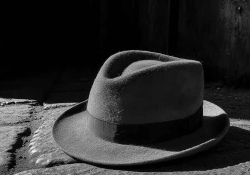Critical Lovemaking

Whether you celebrate or lament Valentine’s Day, here’s a new story of love’s demise.
The Critic had a new girlfriend. He had met her at a Barnes and Noble, the one on Union Square, where they had both reached for the last copy of Proust’s Remembrance of Things Past. Their hands had met, and then their eyes. There had been a shuffling of feet, an exchange of fluttering words. Unknowable things had aligned themselves, with the result that the Critic was now very much in love.
That same day the Critic, in his weekly column, called Leif Samuelson’s latest novel “a triumph, the work of a visionary, nothing short of stunning.”
This new love in his life had already produced in the Critic the kinds of changes he routinely observed in others, and which he had lived in mortal fear of, to wit: a tendency to meet obstacles with a certain amount of cockeyed optimism, a growing appreciation of the sky and nature in general, and the alarming habit of window shopping.
“Stefano de Leon’s movie is powerful and uplifting,” the Critic wrote. “It succeeds in breathtaking fashion.”
The Critic was particularly fond of the girlfriend’s nose, especially when he looked at it in profile. He was taken, also, by her hair, which he thought ranked among the best heads of hair he had yet seen. Finally, he loved the grace and dignity with which she imbued everything she did, everything she said. This struck the Critic as a remarkable trait. “The girlfriend,” the Critic wrote, “is compassionate and wonderfully human.”
The Critic was particularly fond of the girlfriend’s nose, especially when he looked at it in profile.
The highly acclaimed girlfriend, for her part, loved the way the Critic had relinquished his hold on the Proust.
*
They were, by all appearances, inseparable in those first days. The Critic took the girlfriend to see movies. He took her to his favorite jazz club, they dined at his favorite restaurant. They rediscovered the city foot by foot. They found something new in rain, in music, in the way shoes sounded on the sidewalks, and so on.
They found something new in rain, in music, in the way shoes sounded on the sidewalks, and so on.
All week, the Critic found himself assailed by strange ideas wherever he went. Sentences leaped out at him fully formed, such as for instance this one, which the Critic recorded after a week of dating the girlfriend: “New York’s summers are the apotheosis of all summers everywhere, just as her winters are the apotheosis of every winter that ever was, anywhere.”
*
On a very fine day (a day made for window shopping), the Critic and the girlfriend were taking a stroll through Central Park.
“Oh, isn’t it beautiful?” cried the girlfriend.
“The sky is flawless,” the Critic answered. “So far, it is the brightest, the boldest sky we’ve seen all year. It is a major accomplishment.”
*
The relationship was consummated not long after with great success. The Critic wrote: “Nothing was missing on this opening night. All in all, a very able, heartfelt performance by the Critic.”
After giving it some thought, the Critic enthusiastically added: “New York is love.”
*
Things progressed nicely for some time, with the notable exception of the second night, in which the Critic felt unable to live up to expectations. He chalked it off to sophomore slump.
On the third night, and on every night thereafter for a month, the Critic was back on track. He wrote: “The Critic dazzles . . . some of his finest work . . .”
“Delightful . . . another classic performance by the Critic . . .”
“The variety and richness of the Critic’s repertoire has not the palest rival . . . a real magician . . .”
“The Critic . . . is working at the peak of his powers . . .” “Ingenious . . . the Critic delivers his masterpiece . . .”
*
It was the happiest the Critic had ever been. He wanted to spend every waking moment with the girlfriend. They were frequently seen at all the major social events of the city. There were some public displays of affection. They walked hand in hand.
The change, when it came, was imperceptible at first. A stone had, unnoticed by all, entered the sublime machinery and brought it out of step.
The Critic noticed how he loved even the little imperfections in the girlfriend. Her legs (just slightly too short) were, he thought, not without charm but ultimately a little disappointing. Similarly, her shoulders (too manly; should the girlfriend perhaps cut back on her swimming?) weren’t going to make anyone’s year-end lists. Her ears (too much lobe) showed promise but in the end fell flat.
The Critic prided himself on the fact that he was able to make light of these inconsistencies.
*
Although the Critic continued to love the girlfriend to generally favorable reviews, it was no longer the same. The Herald Tribune, on August 2, wrote that “the Critic, considering the adverse circumstances, performed admirably but lacked a cohesive strategy.” The Chicago Sun-Times commented on the Critic’s August 5 performance: “The Critic’s presentation was inconsistent. Occasional flashes of brilliance were offset by lackluster episodes. Not his shining hour.” The Record, out of Hackensack, New Jersey, published an article on August 9, claiming that “the Critic’s performance was competent. However, he seemed at times to be forgoing innovation in favor of a rehashing of old favorites.” On August 10, the Wall Street Journal wrote: “The Critic is out of ideas.”
*
On August 15, the Critic once more entered a Barnes and Noble in search of Proust. He now alternated between the one in Greenwich Village and the one on Fifth Avenue, where he hoped he would never see the girlfriend. He never went window shopping anymore. He completely ignored the sky. A few days later, he felt compelled to write the following: “The New York summer is a dreary, bloated thing.”
Hilchenbach, Germany















